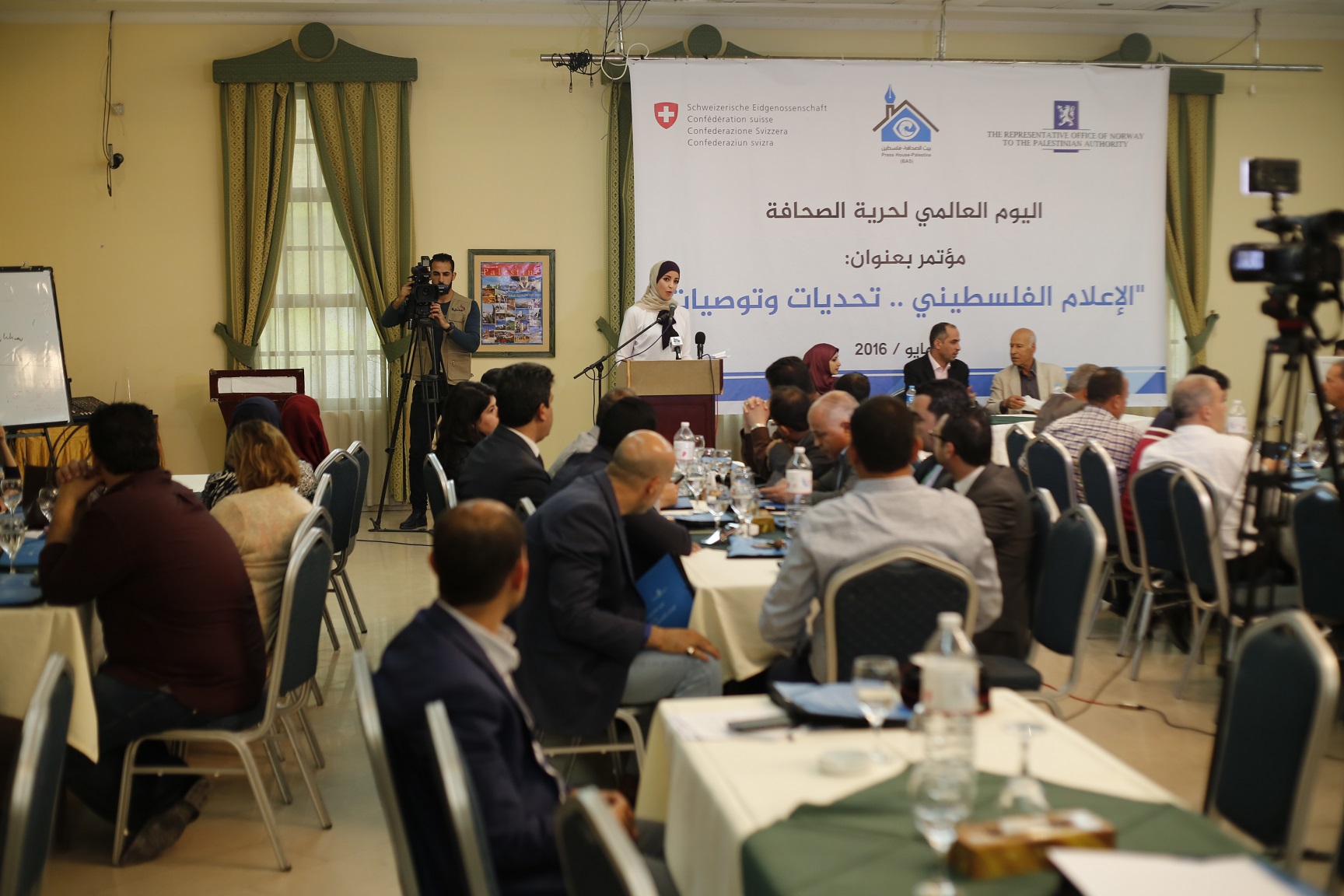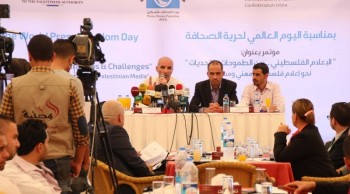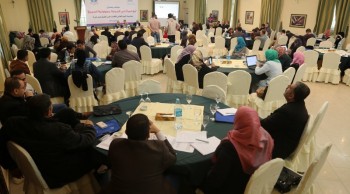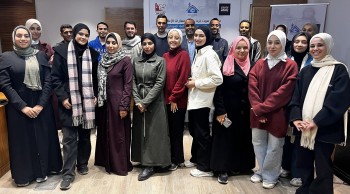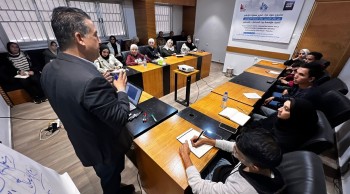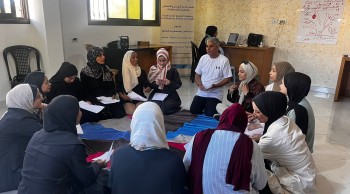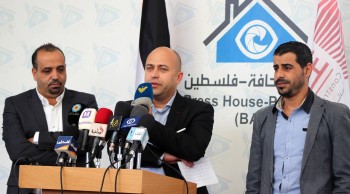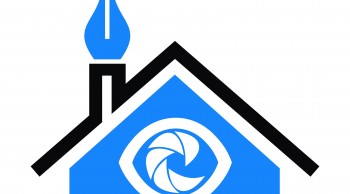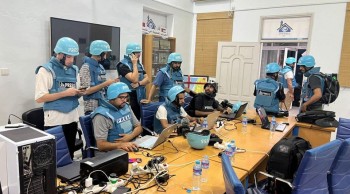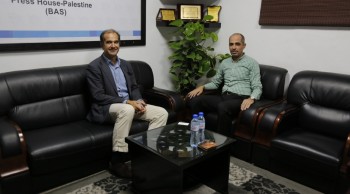Gaza,3/5/2016--- Press House held a conference, titled" The Palestinian Media ..Challenges & Recommendations" within a series of activities the organization implemented on the occasion of the international day of Media Freedom, in the presence of tens of journalists and media-university, civil society representatives, law workers, and media students.
The conference was opened with the Palestinian National Anthem, and reciting Al-Fatiha on the souls of the journalism martyrs, to be followed by the speech of the chairman of Press House" Belal Jadallah"
Jadallah appealed all the law and human rights organizations to highly follow journalists killers prosecution throughout the last years, and pursue them to all international forums, trying to stop the oppression imposed to the Palestinian journalism.
As every journalist request of being cooperated to face the occupation, he called for media unity of information body in order to stop the occupation who has been violating our freedom and killing the voice of journalism under a strong united Palestinian vision.
Jadallah stressed on the necessity of holding the journalism- crimes committers responsibility, so that we could celebrate journalism freedom of new year.
He also assured the importance of enhancing the right to get information for enjoying a professional objective media, that enhances freedom of speech, away from fear and threatens, asking in the same time to pay attention to the fresh media graduates and activists, and provide them with facilities as well as empower their capabilities at organizations without any kind of exploit.
In his turn, Tawfiq Shomar, writer and political analyst, called for cooperation and journalistic ethics enhancement, where this became a main need to be asked on the international day of Journalism Freedom. He also asked to make a united journalistic body, doing something for the independence of Palestine.
Shomar added that journalists are devoting great efforts to convey the truth as it is and uncovering the Israeli violations against the Palestinians.
He expressed his pride of journalists, saying " I name you nothing but a fighter; therefore, we have to be proud of what the martyrs did for the generations freedom."
Shomar sent a message to the Palestinian journalists, saying" You are conveying the truth, using your cameras as weapons against corruption, oppression and occupation. "
The first session led by the journalist Sherien Khalifa, started with the speech of Dr.Ahmed Hammad, media lecturer of Al-Aqsa university, talking about media freedoms reality in Palestine.
Hammad said that the last year witnessed a shortage of the Palestinian media freedoms, indicating that the number of violations, committed against journalists and media freedoms of Gaza and the West Bank, had increased last year. Plus, there was expansion in repression practices including ousting media outlets and journalist from events locations.
He explained that the violations committed against media freedoms in the Gaza Strip, lie on four types; physical assaults(16 violations), callbacks (15), arrests (13), and 7 detention cases against journalists.
Hammad added that although the violations against Gaza strip journalists were less than the West Bank, the number of violations recorded in the Gaza Strip has highly increased to the average of 217% comparing it with 2014 according to Mada Center.
He said that despite the great hopes the Palestinians hold about reconciliation to eliminate all the existing challenges and overcome the barriers to development, reconciliation is still " Magic Recipe" for solving various social, national, and societal problems.
Asking for persecuting and holding the violation-committers of the Israeli occupation army responsibilities including the murders of 17 journalists and media workers, Hammad asked to put an end to immunity, and bring them to justice as a key to stopping the violations against media freedoms of Palestine.
Baker Al-Turukmany, legal advisor of Coalition For Accountability& Integrity "Aman", presented the reality beyond training and volunteering at the media organizations.
He said that many media graduates and trainees are crowded at the media organizations, without getting paid.
Turukmany said that one of the challenge faced by media organizations is that there is no special board for volunteers to pay attention to them and guide them to the best decision based on their choices, and there is no clear role led by volunteers based on their choices, as well as special programs for training volunteers for quitting them well, are obviously absent.
He said that most of the organizations do not appreciate the efforts devoted by volunteers, and even they do not mind commissioning them to much work, where the unqualified people of their relatives can get a job due to outsourcing.
Turulmany concluded his speech criticizing the absence of rules and laws that call for fair volunteering.
At the second session led by the journalist Safaa Al-Habil, Wael Abdel-Aal, head of literature and human sciences department at the University College, presented the ways to practice aspect enhancement in the media colleges.
Abdel-Aal asked to edit the academic curriculums of media and journalism majors at the Palestinian university by Accreditation and Quality Department of the Ministry of Education, and set an intensive development plan through which all media departments are forced to get practical aspect involved in their plans and curriculums in a percentage of 50%( they also have to follow the journalism and media updates and harness them in digital technology in a way that enhances students understanding of the academic curriculums and their interaction.
He called to harness the infrastructure of media programs and department by providing laboratories, studios, and technical equipment in order to provide an education environment, and find stimulation patterns to practically train the students such as creating a sample that stimulates media locations of wars and unrest, as well as educate them how to live these atmospheres professionally in a ways that contributes to getting themselves involved in the field during their studying stage.
He stressed on the importance of discovering the media talents of students, embracing and enhancing them, where the focus must be on the quality not the quantity. He noted that the average admission of media programs should be edited, and students must be opened to the professional media organizations to get experience and widen their expertise of the field.
After a while, Suod Abu-Ramadan presented the weakness point in the international media speech.
He said that such necessary plans must be set through forming a group of Palestinian and Arab experts especially those who live in the foreign country and speak different languages in general and English language in particular, beside some foreign supporters of the Palestinian issue who have enough background about the international media fields, politics and international relation.
Abu-Ramadan called for creating a media generation based on professional standards not on fictional or religious ones, and paying attention to the Palestinian and Arab communities who live in the foreign countries.
He stressed on the importance of finding offices for the international media outlets in the occupied Palestinian territories.
He noted that the National Authority and the Ministry of Information in cooperation with the Palestinian lawyers Syndicate in Palestine, hold responsibility of working with the Palestinian liberation Organization and other factions , as well as all civil society organizations, in order to dave all international media outlets to open special offices in the Palestinian territories, where their heds must be selected by their countries, after being accepted by the Palestinian Authority and qualified editors, writers and journalist of those who speak foreign languages well, will be working on these offices too.
Conference Recommendations:
- Prosecute and bring the violations committers against journalists to justice, putting an end to munity as a key to stopping their advancing violations against the media freedoms of Palestine.
- The importance of stopping the various violations recorded in Palestine, which is considered as law break to the Palestinian laws of journalism freedom and freedom of expression, by the Palestinian Authorities.
- Stop control and persecution, which are obviously witnessed these days, against social media.
- Address the law of access information right .
- Establish and Regulate the higher council of media through cooperating with the civil society organization, with a help from law academic specialists .
- The importance of organizing voluntary work through finding a special system of volunteering or conducting special operations that organize training and volunteering process at media organizations.
- The importance of cooperation among the public, private, and governmental media organization in order to set a practical and technical approach for training and volunteering in media field in partnership with media colleges of the Palestinian universities.
- There is an urgent need for a special law that organizes voluntary works in Palestine, since the Palestinian labor law did not tackle this issue.
- The media organization had to take its role of protecting the volunteers and trainees, and avoiding exploit through using their control role and managing voluntary and training as well.
- Edit the academic curriculums of journalism and media majors at the Palestinian universities by accreditation and quality department of the higher Ministry of Education.
- The academic plans of media and journalism plans must follow the updates of the rapid development of the field, and use the digital technology in education in a way that enhances the understanding and absorption of the material and increases their interaction.
- Infrastructure of media programs and departments should be invested through proving laboratories, studios, technical and technological equipment , in order to provide education environment near to market reality.
- Stimulation patterns should be found to practically train students like forming a patterns that stimulates media organizations with their situations
- Media talents should be discovered and embraced to develop their capabilities, which indicates the importance of focusing on the quality not the quantity, and editing the admission range of media major at universities.
- The importance of cooperation with professional media organizations, where students can get benefits from their expertise during their studying.
- The academic staff of journalism departments should be developed through providing them with opportunities to go for training fellowships at professional organization to exchange expertise with them.
- Form a group of Palestinian and Arab experts, especially those who live in the foreign countries and speak various languages professionally , as well as foreign supporters of the Palestinian issue who understand the international media fields, politics and international relations.
- The Palestinian Authority and the Palestinian Liberation Organization Factions as well as the other factions, set spokesmen of Arabic and English Languages both, who also have to be media specialists and possess enough expertise to internationally serve the Palestinian issue.
- The Palestinian Authority and the factions of the Palestinian Liberation Organizations in cooperation with the civil society organizations have to launch a national awareness campaign in Palestine, educating people of the dangers of fake and wrong publications, interviews and T reports that harsh our issue in front of the international view, especially those who are active in social media but do not have journalistic experience.
- Pay attention to the Palestinian and Arab communities, living in the foreign countries and continuously be in touch with them, as well as get a help from the people who study or work in journalism field.

